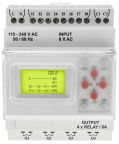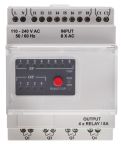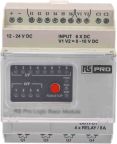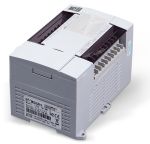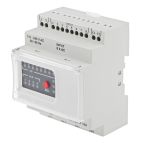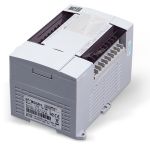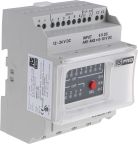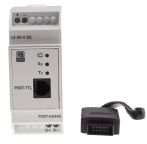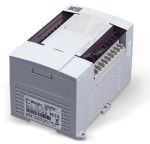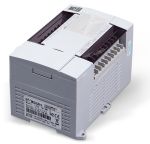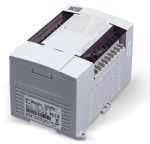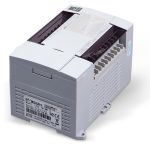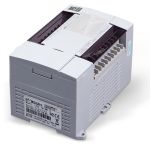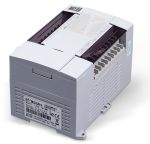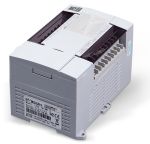PLCs - Programmable Logic Controllers
PLC stands for Programmable Logic Controller. It is a digital computer-based control system commonly used in industrial automation to monitor and control machinery or processes. A PLC is designed to withstand harsh industrial environments and is typically used to automate tasks that require precision, reliability, and flexibility. It consists of a programmable microprocessor, input and output modules, and various communication interfaces.
Types of PLC Controllers
RS NZ offers a comprehensive range of programmable logic controllers** (PLCs)** to cater to diverse automation needs. These PLC controllers vary in size, functionality, and application, ensuring you find the perfect fit for your project.
Fixed/Compact PLCs
Fixed or compact PLCs are all-in-one units ideal for smaller applications with limited I/O requirements. These mini PLCs are cost-effective and easy to install, making them perfect for simple automation tasks.
Modular PLCs
Modular PLCs offer flexibility and scalability, allowing you to customise the system based on your specific requirements. These PLC systems consist of a base unit and expandable modules for various functions like digital I/O, analog I/O, and communication.
Rack-Mounted PLCs
Rack-mounted PLCs are designed for larger and more complex automation projects. These industrial PLCs are typically installed in standard 19-inch racks, offering high performance and expandability for demanding applications.
Soft PLCs
Soft PLCs are software-based controllers that run on standard PCs or industrial computers. These PLC control systems offer cost-effective solutions for applications where hardware flexibility is paramount.
Safety PLCs
Safety PLCs are specifically designed to monitor and control safety-critical functions in industrial processes. These programmable controllers ensure compliance with safety standards and regulations, protecting personnel and equipment.
Distributed PLCs
Distributed PLCs consist of multiple interconnected controllers, each responsible for specific tasks within a larger automation system. These PLC controllers offer enhanced reliability, redundancy, and modularity for complex applications.
How do PLCs (Programmable Logic Controllers) work?
Programmable logic controllers (PLCs) are the brains behind industrial automation. They continuously monitor inputs from sensors and devices, process this information according to programmed instructions, and then control outputs to achieve the desired automation goals. Here’s a breakdown of the PLC work process:
- Input Acquisition
- Program Execution
- Program Logic
- Decision Making
- Output Control
- Communication
- Monitoring and Diagnostics
What are the Benefits of PLCs (Programmable Logic Controllers)?
- Flexibility: Provide a high degree of flexibility in terms of programming and reprogramming. They allow for easy modification and adaptation of control logic to accommodate changes in the process or system requirements without requiring hardware modifications.
- Reliability: Designed for reliable operation in harsh industrial environments. They are built to withstand extreme temperatures, vibration, electrical noise, and other challenging conditions. PLCs are known for their robustness and durability.
- Real-time Operation: Offer real-time control, enabling precise and timely response to inputs and events. This is crucial in applications that require fast and accurate control, such as high-speed manufacturing processes or critical safety systems.
- Diagnostics and Troubleshooting: PLCs provide built-in diagnostics and monitoring capabilities, allowing operators to detect faults, analyse performance, and troubleshoot issues quickly. This facilitates maintenance and minimises downtime.
- Safety Features: Many PLCs offer safety-oriented functionality, including specialised programming languages and certified safety modules. Safety PLCs ensure compliance with industry safety standards and provide features such as safety interlocks, emergency stop functions, and fault detection.
- Remote Access and Monitoring: PLCs with network connectivity allow for remote access and monitoring, enabling operators to control and monitor processes from a central location or through secure remote connections. This enhances operational efficiency and facilitates remote troubleshooting.
Applications of PLCs
- Manufacturing: Programmable logic controllers (PLCs) are used to control and automate production processes in various industries, such as automotive, aerospace, electronics, and food and beverage. They can control robots, conveyor belts, assembly lines, and other equipment, improving efficiency and productivity.
- Power generation and distribution: Industrial PLCs are used to monitor and control power plants, substations, and transmission lines. They can monitor and adjust voltage, frequency, and other parameters to ensure safe and reliable power delivery, preventing blackouts and other disruptions.
- Chemical and petrochemical industry: PLCs are used to control and automate chemical processes, such as distillation, polymerization, and separation. They can monitor and adjust temperature, pressure, flow, and other parameters to ensure efficient and safe production, minimising the risk of accidents and environmental damage.
- Water and wastewater treatment: PLC systems are used to control and automate water and wastewater treatment processes. They can monitor and adjust flow, pH, chlorine levels, and other parameters to ensure clean and safe water for consumption and environmental protection.
- Food and beverage industry: Programmable controllers are used to control and automate food and beverage production processes, such as mixing, cooking, bottling, and packaging. They can monitor and adjust temperature, pressure, flow, and other parameters to ensure food safety and quality, meeting regulatory requirements.
- Automotive industry: PLCs are used to control and automate automotive production processes, such as welding, painting, and assembly. They can monitor and adjust robot movements, conveyor belts, and other equipment, increasing production speed and accuracy.
- Pharmaceutical industry: PLC control systems are used to control and automate pharmaceutical production processes, such as mixing, blending, and packaging. They can monitor and adjust temperature, pressure, flow, and other parameters to ensure drug safety and quality, complying with stringent regulations.
- Packaging and material handling: PLCs are used to control and automate packaging and material handling processes. They can control robots, conveyor belts, and other equipment to ensure efficient and safe packaging and transport of goods, minimising damage and reducing labour costs.
- Oil and gas industry: Industrial controllers are used to control and automate oil and gas production processes, such as drilling, pumping, and refining. They can monitor and adjust pressure, flow, temperature, and other parameters to ensure safe and efficient production, protecting the environment and maximising resource recovery.
How to buy PLC from RS?
Programmable logic controllers (PLCs) are essential for automating industrial processes, and RS New Zealand is your trusted source for a wide range of high-quality PLC controllers online. We offer a comprehensive selection of PLC controllers for sale**,** from compact and mini PLCs for smaller applications to industrial PLC controllers for complex automation projects.
Our diverse range includes renowned brands like Siemens, Schneider Electric, and Omron, ensuring you find the perfect PLC to meet your specific requirements.
Delivery Information for New Zealand
To have your purchases delivered the next working day, please place your orders for items stocked locally in New Zealand or Australia before 5 pm NZT and 3 pm NZT, respectively.
RS will deliver your PLC controller order between 8 am and 5 pm local time the next working day. However, a longer lead time may be required for some products, including:
- Global Stock and Extended Range products.
- Orders of hazardous materials.
- Products over 20kg, with a cubic weight exceeding 20kg, or longer than 1.5 metres.
Extended lead times may also apply to non-core products and deliveries to specific regional areas. For further details or to arrange consolidated delivery, please speak to our Customer Service.
Popular Searches
Related links
- RS PRO Logic Controller for Use with RS PRO PLC Expansion Modules Relay Output DC Input
- RS PRO Logic Controller for Use with RS PRO PLC Expansion Modules Transistor Output DC Input
- RS PRO Logic Controller for Use with RS PRO PLC Expansion Modules Transistor Output,
- Turck TBEN-L4-PLC Series Logic Controller PNP Output PNP Input
- RS PRO Logic Controller for Use with RS PRO PLC Expansion Modules Transistor Output DC Input
- RS PRO Logic Controller for Use with RS PRO PLC Expansion Modules Transistor Output DC Input
- RS PRO Logic Controller for Use with RS PRO PLC Expansion Modules Relay Output DC Input
- RS PRO Logic Controller for Use with RS PRO PLC Expansion Modules Relay Output DC Input

